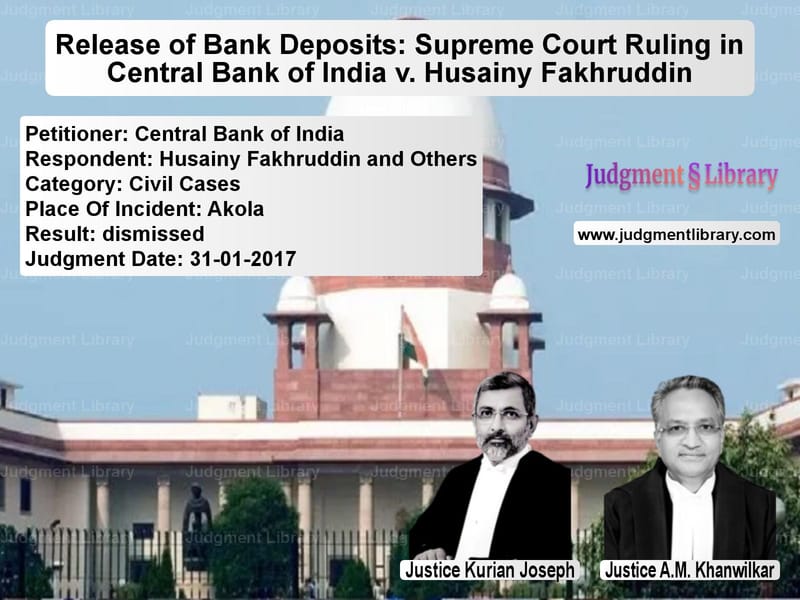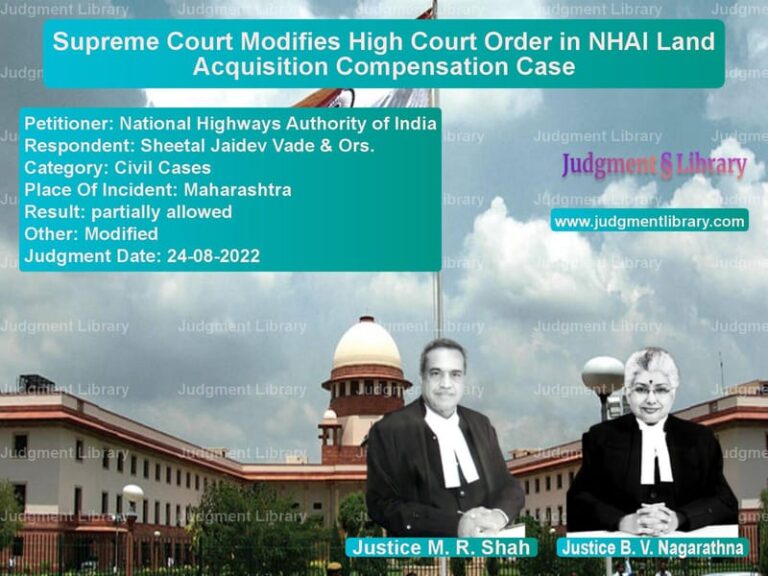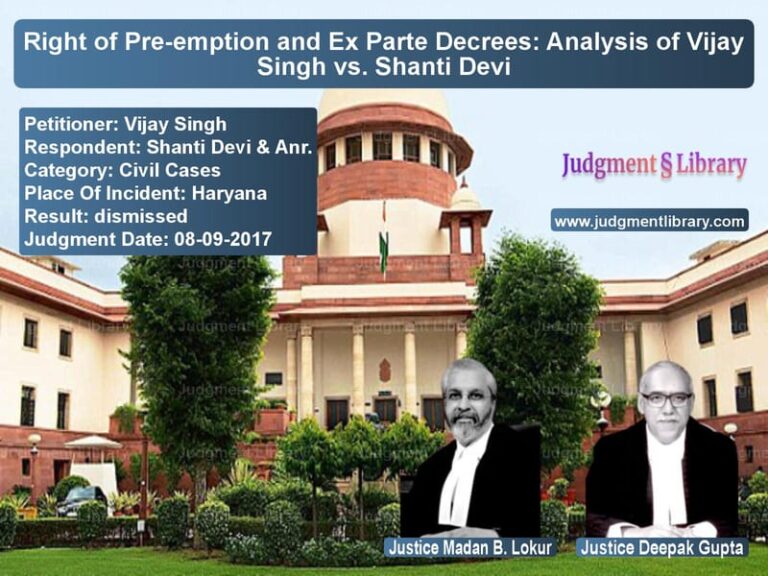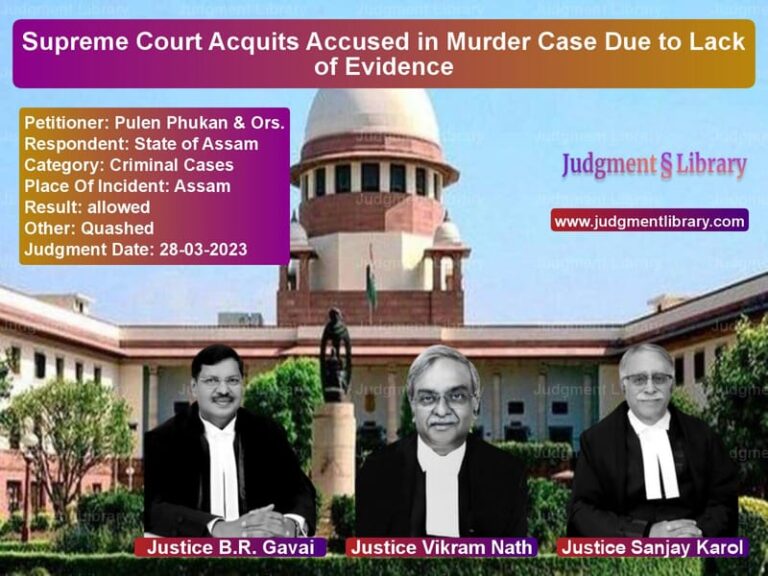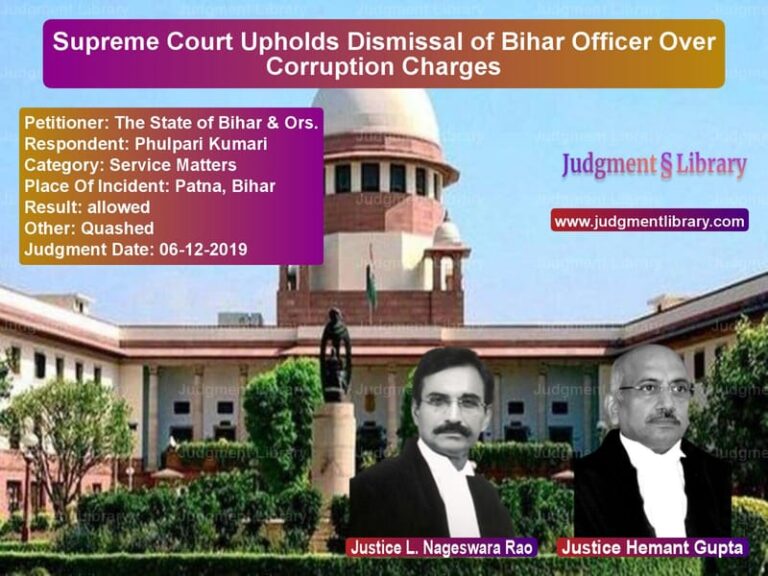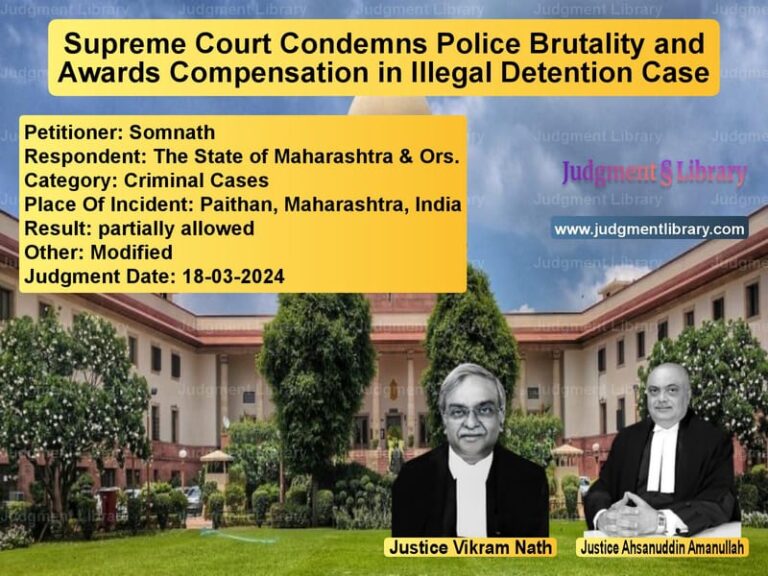Release of Bank Deposits: Supreme Court Ruling in Central Bank of India v. Husainy Fakhruddin
Introduction
The case of Central Bank of India v. Husainy Fakhruddin and Others revolves around a dispute over the release of bank deposits that were withheld following a request from the Central Bureau of Investigation (CBI). The Supreme Court addressed whether the bank was justified in withholding the deposits and ultimately directed the bank to release the amounts to the respondents, as the CBI had withdrawn its objection.
Background of the Case
The dispute began when Respondents 1 to 4 made a request to the Central Bank of India to withdraw their deposits. While the bank was processing the request, the CBI issued a communication dated December 6, 2005, requesting the bank not to release the deposits until further notice. The respondents challenged this in the High Court through Criminal Writ Petition No. 496 of 2006. The High Court ruled in favor of the respondents and directed the bank to release the deposits.
The bank, dissatisfied with the High Court’s order, filed an appeal before the Supreme Court.
Legal Issues Raised
- Was the Central Bank of India justified in withholding the deposits based on the CBI’s request?
- Did the High Court err in directing the release of the deposits without considering the CBI’s investigation?
- What are the implications of the CBI’s withdrawal of its request on the bank’s decision to withhold the deposits?
Arguments by the Appellant (Central Bank of India)
- The bank withheld the deposits in compliance with the CBI’s communication dated December 6, 2005.
- The bank was acting in good faith to assist an ongoing investigation and had no intention of unlawfully denying the respondents access to their funds.
- The High Court should not have directed the release of the deposits without fully understanding the implications of the CBI’s investigation.
Arguments by the Respondents (Husainy Fakhruddin and Others)
- The bank had no valid reason to withhold their deposits after the CBI withdrew its objection.
- Their deposits were private funds, and the bank had an obligation to release them unless there was a legally valid reason for withholding them.
- The High Court correctly directed the release of the funds as the bank’s action was based solely on the CBI’s request, which had since been withdrawn.
Supreme Court’s Judgment
The Supreme Court upheld the High Court’s decision and directed the bank to release the deposits. The Court observed:
“Learned Counsel for the CBI, on instruction, submits that they have withdrawn their request to the Bank, and from their side, there is no objection for release of the amounts.”
The Court further noted:
“The main objection to the release was the request made by the CBI, and hence, this appeal is disposed of with a direction to the appellant-Bank to release the deposits made by Respondents 1 to 4, in case the same are not to be withheld for any other reason.”
The Court clarified that all other legal issues raised by the bank were left open and not decided in this case.
Key Takeaways from the Judgment
- Withdrawal of Objection: Once the CBI withdrew its request, the bank no longer had a valid reason to withhold the respondents’ deposits.
- Obligation to Release Funds: Banks have a duty to release deposits unless there is a clear legal reason to withhold them.
- No Determination on Legal Issues: The Court did not address the broader legal issues raised by the bank and left them open for future consideration if necessary.
Implications of the Judgment
This ruling highlights the following important principles for banks and investigating agencies:
- Banks must act in good faith and in accordance with legal instructions but cannot indefinitely withhold funds without a valid reason.
- Investigating agencies must communicate any withdrawal of objections clearly and promptly to avoid unnecessary delays in the release of funds.
- Legal issues related to the validity of withholding deposits may require separate adjudication in cases where investigations are ongoing.
Conclusion
The Supreme Court’s ruling in Central Bank of India v. Husainy Fakhruddin emphasizes that banks must release deposits once any objection from investigating agencies has been withdrawn. The decision upholds the rights of deposit holders while ensuring that banks comply with lawful instructions in a transparent manner.
Don’t miss out on the full details! Download the complete judgment in PDF format below and gain valuable insights instantly!
Download Judgment: Central Bank of Indi vs Husainy Fakhruddin a Supreme Court of India Judgment Dated 31-01-2017.pdf
Direct Downlaod Judgment: Direct downlaod this Judgment
See all petitions in Damages and Compensation
See all petitions in Judgment by Kurian Joseph
See all petitions in Judgment by A M Khanwilkar
See all petitions in dismissed
See all petitions in supreme court of India judgments January 2017
See all petitions in 2017 judgments
See all posts in Civil Cases Category
See all allowed petitions in Civil Cases Category
See all Dismissed petitions in Civil Cases Category
See all partially allowed petitions in Civil Cases Category

